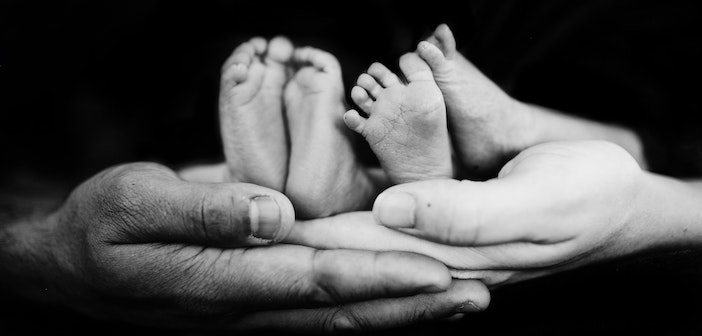As any brother or sister can attest, the relationships between siblings are deep, complex, and sometimes downright weird. But what is it like to raise siblings, when you never had any yourself? What if you are part of an entire generation of people who grew up as only children, and to whom these bonds are perhaps some of the most alien you know? The one-child policy, which was in place between 1979 and October 2015 has given us this exact situation in China, leading to a generation of parents who are now feeling their way in the unfamiliar territory of sibling rivalries.
Many only-child parents who now have two or more kids of their own describe it as bittersweet to see their children interacting in ways that they never got to experience first-hand. Others are shocked to realize that siblings can be – to put it bluntly – bloody awful to each other and blame themselves for the inevitable conflict. For others, it’s just another parenting mystery and every day brings a new challenge and lesson.
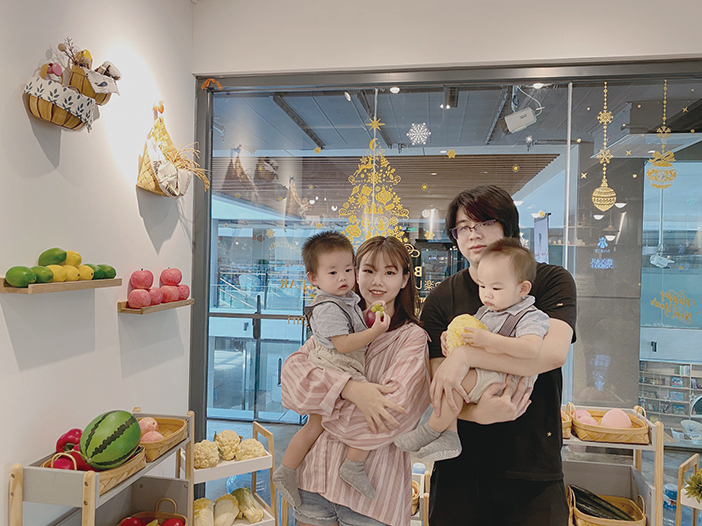
Siyu He and family
Siyu He grew up dreaming of having an older brother who could protect her when she was young, but beyond idle daydreams, did not regret being an only child. “Honestly speaking, since I don’t know the beautiful feelings of having siblings, I never feel disappointed that I didn’t have one.” Yet like many other Chinese of her generation, she does believe that only children are more likely to be lonely, an attitude she says was influenced by her parents. “They are the only generation which had to strictly implement the only-child policy, which is their common regret. They always hoped their children could make up for it.” When starting their own family, He and her husband Huang Yaohui initially decided to have only one child, largely for financial reasons. “With the rapidly increasing cost of raising a child, especially in cities like Beijing, I think it’s better for me to have only one child.” She explains “Compared with spending half the budget on different kids, I prefer to put the whole effort in the only one, which means I could offer the only child as much as I can.” But as they say, the best laid plans of mice and men often go awry and He and her husband ended up welcoming twin boys – Yichen and Yining – into the world a year and a half ago. “Life played a little joke on me,” laughs He.
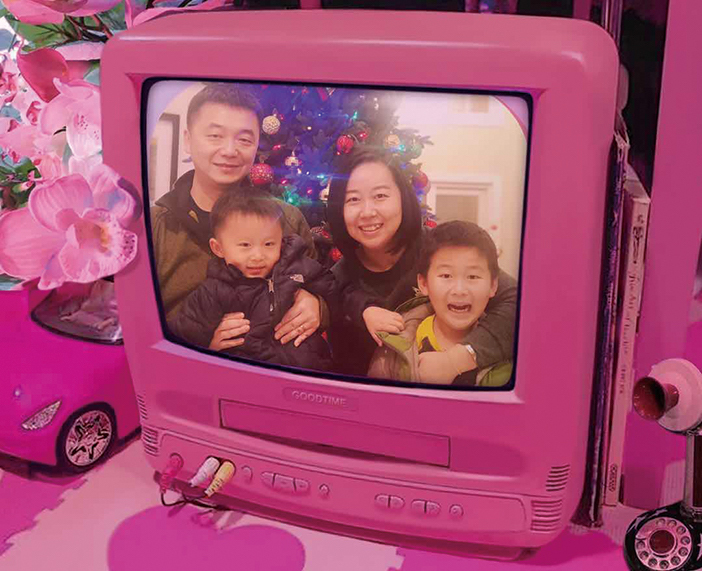
Hong Shen and family
For Hong Shen, having multiple children was always the plan. “When I was in middle school, I thought if I grew up and had kids, I would have two kids, both boys. And my dream came true!” She and her husband Michael Wei are both from China but met in the UK and are now raising their two boys Jacob (10) and David (5) in the US. By chance, the two boys share the same birthday five years apart, but as Shen has discovered, siblings often have extremely different characters, even when they have had very similar childhood circumstances. “Jacob is simpler and more straightforward, while David’s head is teeming with ideas,” says Shen.
Like He, Shen and her husband are both only children, so the process of raising siblings has been an eye-opening experience. Due to the five year age gap, her children do not play together very often, but she sees that changing as time goes on. “Especially during this pandemic, the two brothers spent more time together, and I saw little David trying to keep up with his brother. And we can tell they are happy to have a brother.”
A range of different studies has found that twins tend to form even closer bonds than fraternal siblings, and He has already noticed that despite their squabbling, her two boys can hardly stand to be apart. “Both of them feel lonely and act strangely if the other one is absent, even if they don’t realize it themselves,” she says. “Also, they always love to imitate each other. They scream together, crawl together, run together. One starts doing something, and the other one follows immediately. From their expression, I can tell they enjoy it very much.”
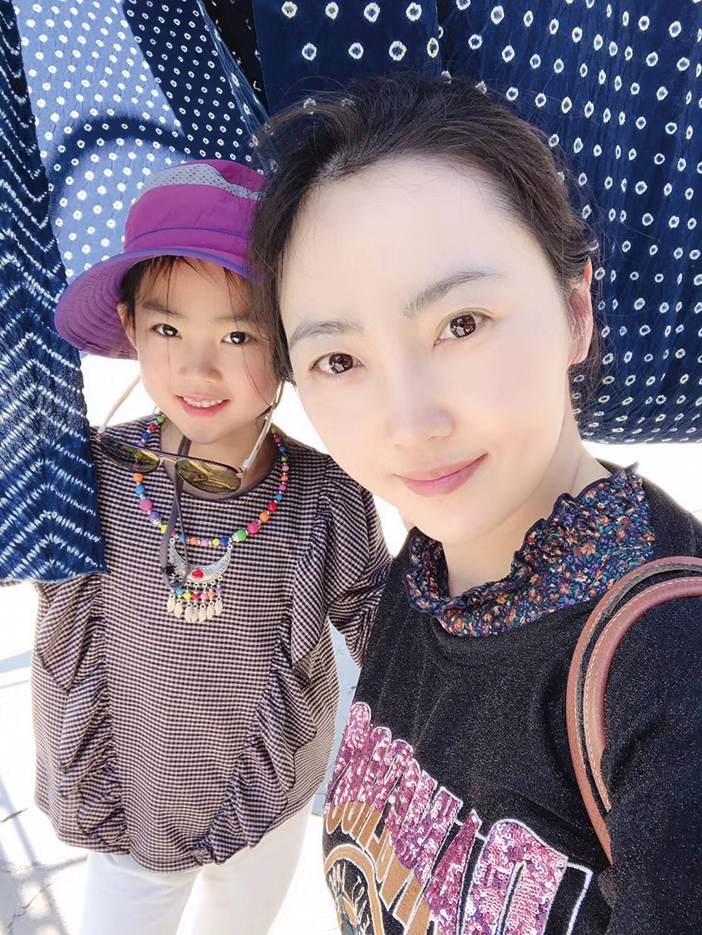
Marina Li and daughter
Both Marina Li and her husband Wesley grew up as only children, but now recognize advantages to having siblings that go beyond one’s own experience, such as caring for other members of the family. “As we get older, especially when our parents are older and you are not around, we begin to feel that if we had a sister or brother, it would be good to take turns to be around our parents and take care of each other.” The Li’s currently only have one child, Angelina (8), and like He, cites the expensive cost of living and education in Beijing as a reason not to have more. However, as Angelina grows up they have begun to soften on their stance. “Angelina has always wanted a sister. When she was a small child, we did not think about her needs seriously, but now she has grown up, we have talked about the matter of having another child seriously with her. She feels that she can help parents take care of her sister.” Li also adds that the fact Angelina is more grown-up and independent now means they have the energy to think about a second child.
While these three families may have diverse experiences and choices, one thing is clear: raising siblings is no walk in the park. “I bought two of everything for them to avoid their fighting” He says of her twin boys “But I failed” she laughs. “They just never stop taking the exact same thing from the other one’s hands. I underestimated the inevitable conflicts between siblings. However, if they fight for my hugs, I am always happy to see that.”
For the Shen family, finding a way to mediate the boys’ conflicts, taking into account the big age gap, has not been easy. “When boys have conflicts, we always try to be impartial judges. I know that sometimes it’s better not to participate, but often it’s out of control.” She has also discovered perhaps the trickiest parenting act of all: finding enough time to spend quality time with each of her children. Without any breathing room between her two boys, He and her husband employ a full-time ayi to add an extra pair of helping hands, but also expressed fears of losing her childrens’ love, and guilt about how much time they spend with their ayi. “Ayi definitely spends more time with my kids than I do, and considering about the kids’ age, they will easily love someone who is always around them and looking after them, I often panic that my kids need ayi more than they need me.”
Shen agrees, saying “Sometimes we feel sorry we don’t spend enough time with them. Sometimes we also feel that we are not good enough for being parents.” Guilt may be the most familiar emotion to many parents, who never feel they are giving enough to their children, but for He, a simple piece of advice shared by another parent has been especially useful. “I always try to spend my time with each of them individually,” she adds. “It’s easy for them to show their aggressive side if they are always together, but when they are alone with me, they behave differently. It becomes easier for them to communicate, show more patience, and have better concentration.” Given some time alone, He finds that the boys are able to express their individual natures more easily. “It helps me to know more about my boys, and it can also help me to find the proper ways to get along with each of them.”
But while Shen and her husband may not have experience with siblings themselves, they know what kind of relationship they want their kids to have. “Hopefully, they’ll understand that they’re supposed to be partners and friends, not competitors.”
KEEP READING: Is It Ever Ok to Discipline Someone Else’s Child?
Images: Courtesy of families, unsplash
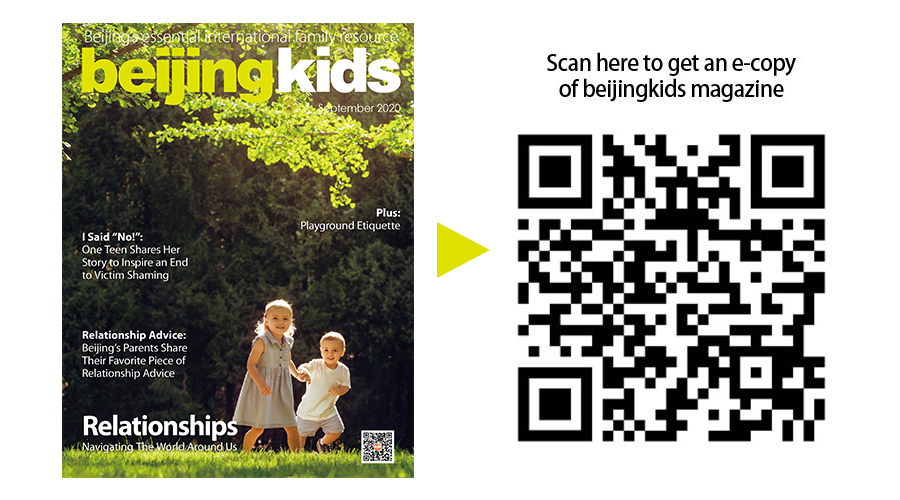
This article appeared in the beijingkids 2020 September issue

